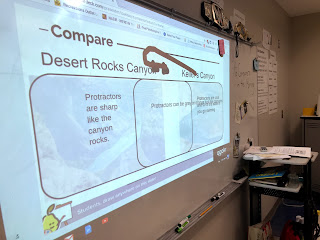This year two big things happened in my science class that have fundamentally changed the way I teach. Tom and I went all in on a gamified classroom. We have leaderboards, power up, teams and a very loose narrative. Then in November, I was introduced to Peardeck, an interactive presentation program that I like so much that I will be presenting on it at USM Summer Spark conference in Milwaukee this summer.
As part of the game Tom and I run, students can earn Power Up cards. These are class rewards, incentives for amazing work in and out of the classroom. They allow kids to choose their seats, read with friends, listen to music during assignments and other things students love to do. Every unit we try to introduce a few new ones to keep class fresh and exciting. The results vary. Sometimes kids will use them, other times they save them because they like collecting them.
After Peardeck became a staple of our rooms, we decided to base a few cards around impacting how other groups would need to respond to questions in Peardeck. One card impacted how many words students could use to respond. That one is fun, especially since it includes a dice roll when played: instant suspense. Today, though, I want to share the story of Mr. Mxyzptlk (yeah, don’t ask me how to pronounce it either. I likely butcher it all the time). The character is a villain in the Superman comics who is known for trickery. When we designed the card, we wanted to make it have interesting and tricky results. Here is what we came up with:
The card has been played a couple times now. Once the student accidentally chose a word that worked out really easily for the group it was played on. The second time, well, it was blog worthy. The child raised his hand. “Mr. Renard, are there a lot of Peardeck questions today?”
I knew why he was asking, gave him a big smile and said, “Yep.”
He reached into his inventory (a 9 baseball card plastic page) and produced Mr. Mxyzptlk. “That group,” he said pointing at the next table over, “must use the word 'protractor' in each of their responses for this lesson.” There was some laughter around the room and a few nerves coming from the table that had been targeted. I explained that they were not allowed to just throw the word in at the end, but it needed to be used in a way that made sense. Here are some of the results.
Other examples included, ‘When looking at the sides of this canyon, we could use a protractor to measure the angles’ and ‘Rocks are hard to break down and it takes water a long time to do it. Not protractors though, they break if you step on them or bend them.’ Not all the answers worked as you can see. When the answer did not work, the player of the card was rewarded.
What really made this special was the way the other students got so excited to read what the target team wrote and how they worked 'protractor' into their responses. The lesson carried into a second day and one of the kids told me that he had thought about ways to use the word when he went home the night before. It never ceases to surprise me how little tweaks like this make my students more creative and excited. It can really take a normal day and make it memorable. I would encourage you to add a monkey wrench to something simple in your classroom and see what happens.





No comments:
Post a Comment